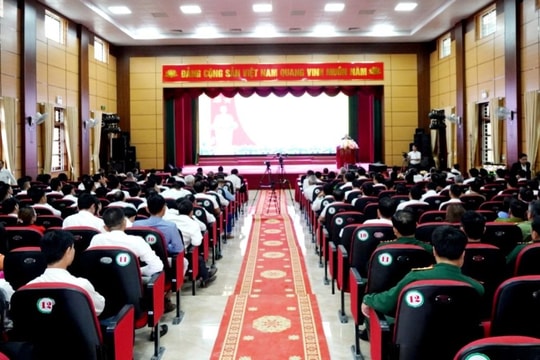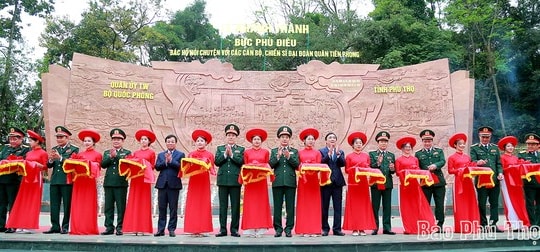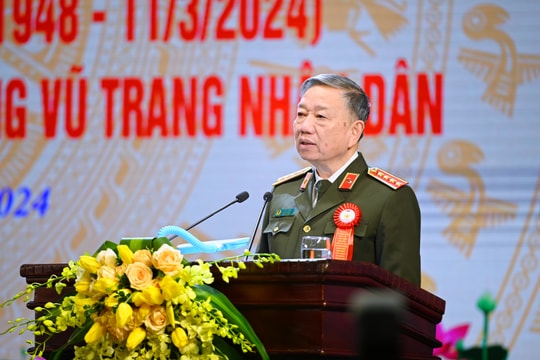President Ho Chi Minh's childhood (1890-1911)
President Ho Chi Minh, whose childhood name was Nguyen Sinh Cung, was born on May 19, 1890, in his maternal hometown, Hoang Tru village (also known as Trua village), Chung Cu commune, Lam Thinh canton, Nam Dan district, Nghe An province (now Kim Lien commune, Nam Dan district, Nghe An province), in a family of Confucian scholars of peasant origin.
His father was Nguyen Sinh Sac (Nguyen Sinh Huy), born in 1862, died in 1929, from Kim Lien village (commonly known as Sen village) in Chung Cu commune, now Kim Lien commune, Nam Dan district, Nghe An province. Nguyen Sinh Sac came from a farming family, orphaned at an early age, and was hard-working and studious from a young age. Therefore, he was adopted by the Confucian scholar Hoang Xuan Duong in Hoang Tru village, who asked the Nguyen Sinh family to take him in.
Being studious and intelligent, and being cared for and educated by the Confucian scholar Hoang Xuan Duong, he passed the Phó bảng exam and made a living by teaching. To his children, Mr. Sac taught them the sense of work and study to understand the principles of being human. When he was young, like many ambitious people of his time, he studied hard in the classics, determined to take the exam. But the more he studied and understood life, the more he realized: "The officialdom is a slave among slaves, even more of a slave".
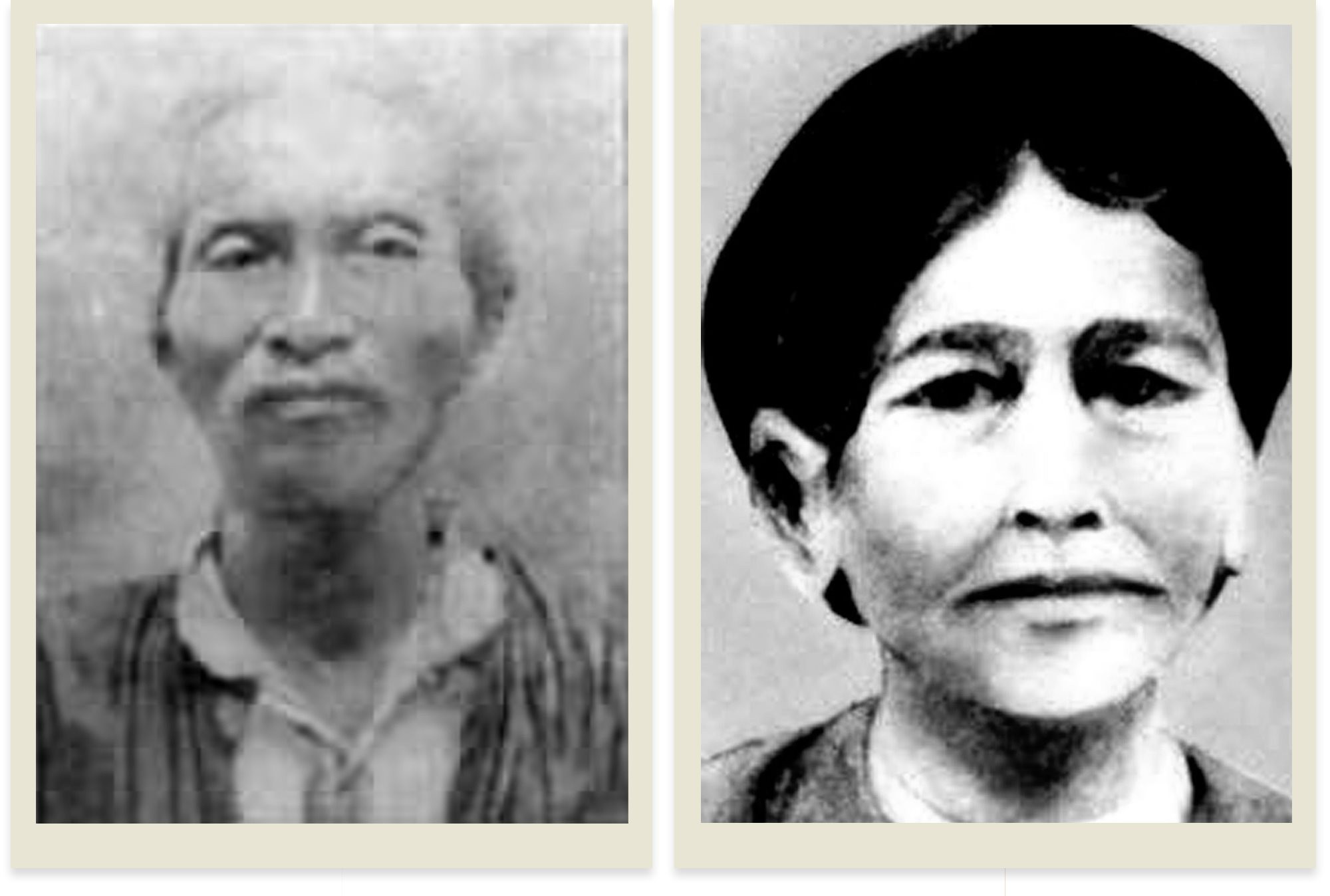
Therefore, after passing the Phó bảng exam and being awarded a small official position, he was patriotic and outspoken, and often opposed his superiors and the French colonialists. Therefore, after a period of being an official, he was dismissed and fired. He went to the South to become a doctor, living a simple life until his death.
His mother, Hoang Thi Loan, born in 1868 and died in 1901, was a diligent, responsible, and kind woman who lived by farming and weaving, loving and caring for her husband and children with all her heart.
His sister was Nguyen Thi Thanh, also known as Nguyen Thi Bach Lien, born in 1884 and died in 1954. His brother was Nguyen Sinh Khiem, also known as Nguyen Tat Dat, born in 1888 and died in 1950. His younger brother was Xin, born in 1900 and died early due to illness.
His siblings grew up under the influence of their grandparents and parents. They were hard-working and compassionate. They were all patriots who participated in the patriotic movement and were arrested and imprisoned by the French colonialists and the feudal court.
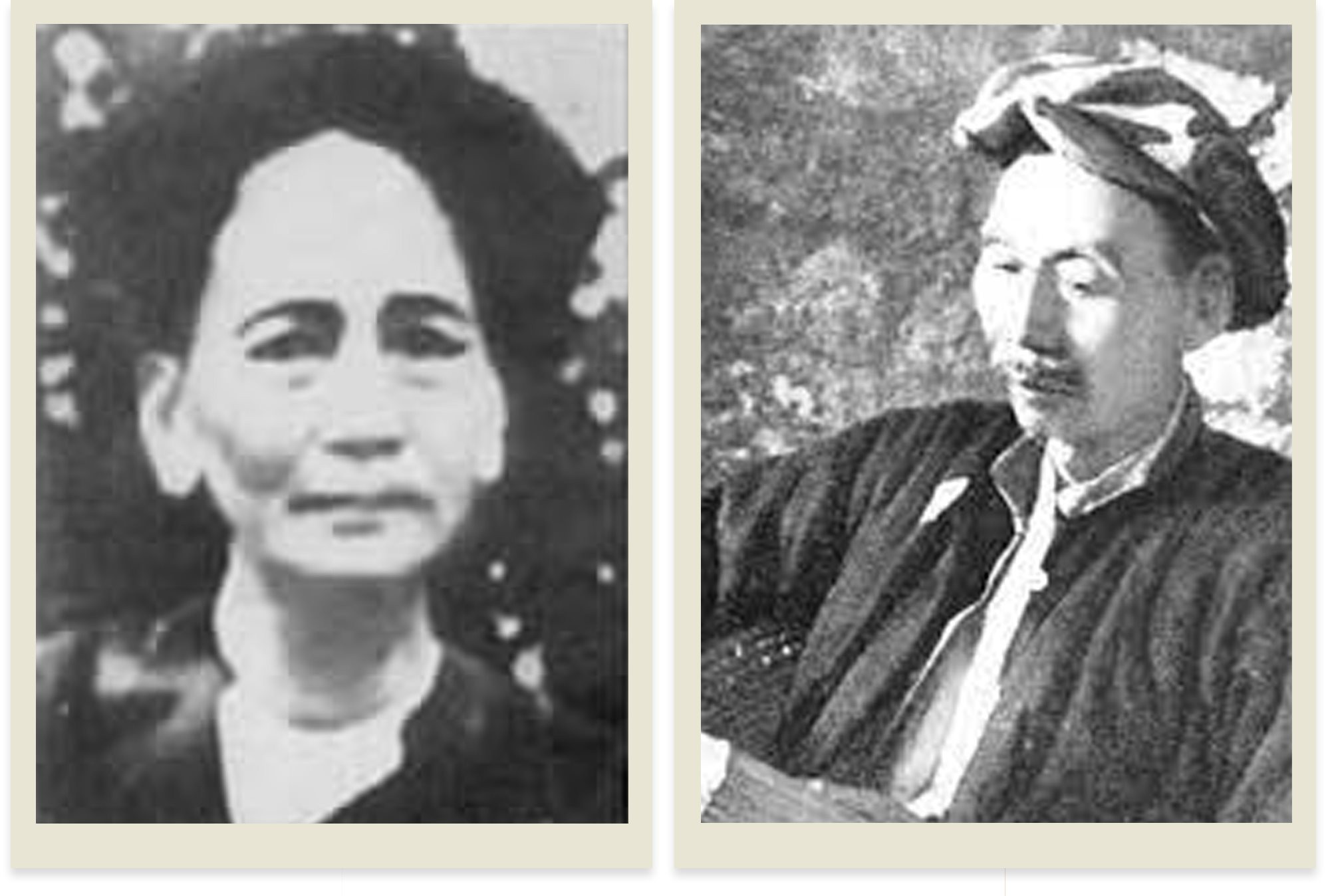
From birth to the age of 5, Nguyen Sinh Cung lived in his hometown under the loving care of his grandparents and parents, growing up in the good traditions of his homeland, being studious, diligent in work, loyal in life and indomitable in the face of enemies. Nguyen Sinh Cung was eager to learn, loved to listen to stories and often asked new things, from natural phenomena to fairy tales that his grandmother and mother often told.
In 1895, Nguyen Sinh Cung and his family moved to Hue for the first time, when Nguyen Sinh Sac entered the capital to take the imperial examinations. From the end of 1895 to the beginning of 1901, Nguyen Sinh Cung lived with his parents in Hue, staying at an acquaintance's house in the citadel (now house number 112, Mai Thuc Loan street). Those were the years when Mr. Sac's family lived in poverty and hardship. Mrs. Hoang Thi Loan worked as a weaver, and Mr. Sac, in addition to studying, had to copy calligraphy for hire to earn a living, to study and take the examinations.
In 1898, Nguyen Sinh Sac took the imperial examination for the second time but still failed. Family life became even more difficult. Near the end of 1898, at the invitation of Nguyen Si Do, Nguyen Sinh Sac returned to teach some students in Duong No village, at the house of Nguyen Si Khuyen (younger brother of Nguyen Si Do), Phu Duong commune, Phu Vang district, Thua Thien province, 6 km from Hue city. Nguyen Sinh Cung and his brother followed their father here and began to learn Chinese characters in their father's class.
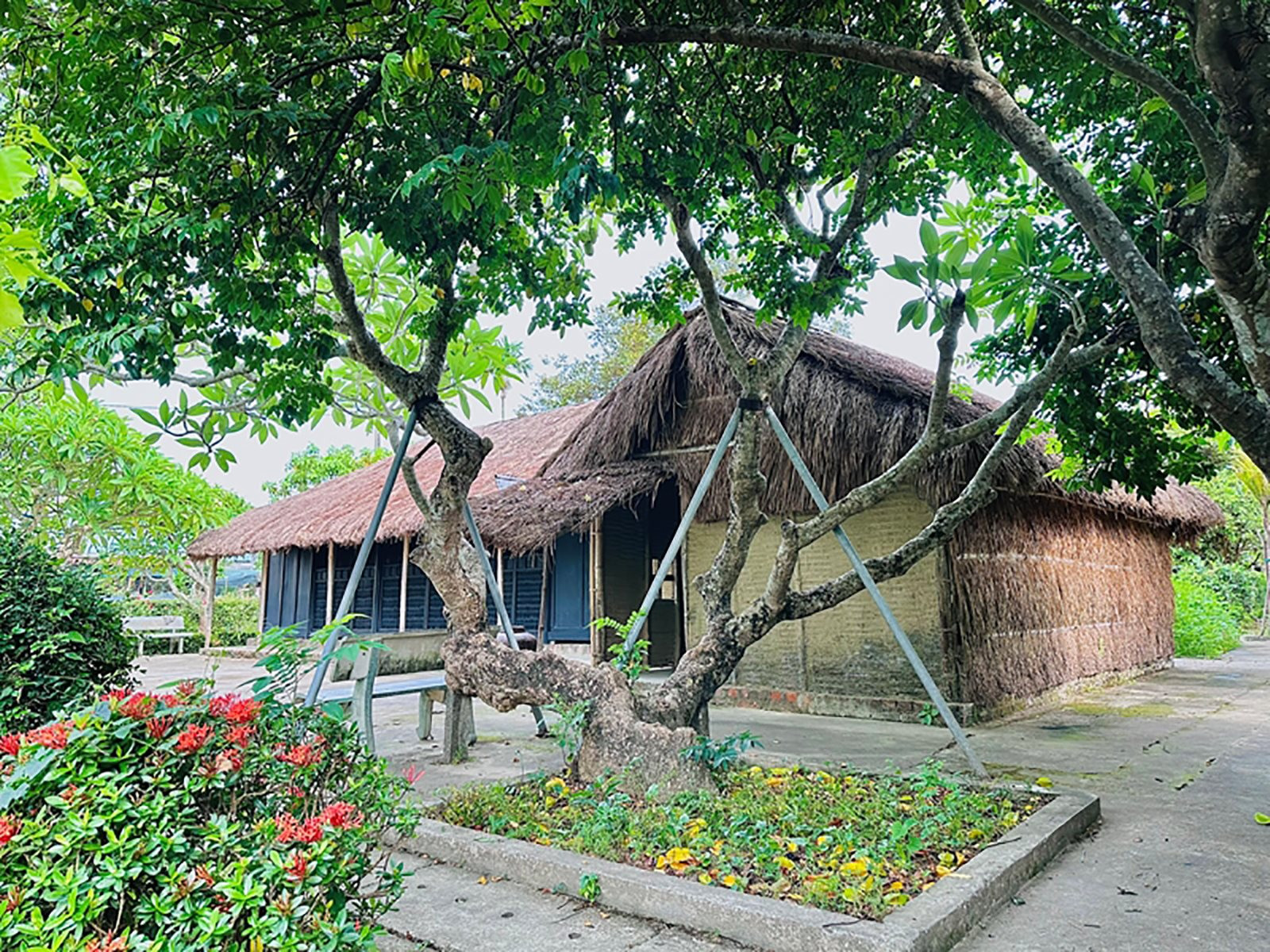
At the end of 1900, Mr. Nguyen Sinh Sac was sent to supervise the examination at the Thanh Hoa provincial examination school. He took Nguyen Sinh Khiem with him, while Nguyen Sinh Cung went to live with his mother in the inner city of Hue. Mrs. Loan gave birth to baby Xin in difficult and poor circumstances, so she fell ill and died. Not long after, baby Xin was too weak and followed his mother. At only 11 years old, Nguyen Sinh Cung suffered the pain of losing his mother and younger brother.
After more than 5 years living in the imperial city of Hue, Nguyen Sinh Cung saw many new things. Compared to his hometown of Nghe An, Hue had many large and beautiful houses and many majestic palaces. Nguyen Sinh Cung also saw many classes of people in Hue: the French rulers were arrogant, domineering and cruel; the Southern Dynasty mandarins were majestic in brocade robes, velvet shoes, and dragonfly-wing hats, but were timid and submissive; and the majority of the laborers suffered the same miserable and humiliating fate. They were the ragged farmers whom the French called country bumpkins, the porters, the coolies pulling rickshaws, the poor children wandering the streets... Those images were deeply imprinted in Nguyen Sinh Cung's memory.
Hearing the news of his wife's death, Mr. Nguyen Sinh Sac hurriedly returned to Hue and brought his children back to his hometown. After arranging a life for his children, and with the encouragement of relatives outside the village, Mr. Nguyen Sinh Sac returned to Hue to take the Tan Suu year examination. This time, he took the new name Nguyen Sinh Huy.
.jpg)
In May 1901, Mr. Nguyen Sinh Huy passed the Tan Suu examination with the title of Phó bảng. Around September 1901, Nguyen Sinh Cung and his family moved back to his paternal hometown. Mr. Nguyen Sinh Huy held a ceremony for his two sons to enter the village with the new names Nguyen Tat Dat (Sinh Khiem) and Nguyen Tat Thanh (Sinh Cung).
In his hometown, Nguyen Tat Thanh was sent to study Chinese with teachers Hoang Phan Quynh, Vuong Thuc Quy and later Tran Than. The teachers were all patriots. Nguyen Tat Thanh heard many stories through discussions of current events between the teachers and patriotic scholars.
Nguyen Tat Thanh gradually understood the current situation and the anguish of his fathers and uncles before the loss of their country and their families. Among the people that Mr. Sac often met was Mr. Phan Boi Chau. Like many patriotic Confucian scholars at that time, Phan Boi Chau was also troubled by the current situation of the country and the fate of the nation. That passionate man, while drunk, often recited two verses of Vien Mai's poem:
“Each meal is immortal, only bamboo is white,
The lowest way to make a living is literature.”.
Mean:
“Every meal (eat) do not forget to record history,
The most humble way to establish oneself is literature.”.
The poem had a great impact on Nguyen Tat Thanh and contributed to guiding the young man to have great ambitions early on.
Growing up, the more he got involved in the lives of the local people, the more Nguyen Tat Thanh realized the miserable fate of the people who lost their country. That was the heavy tax burden along with the people being forced to work as laborers to build roads in the province, build roads from Cua Rao, to Xieng Khouang (Laos) in the wild and poisonous forests. The departures never came back, the people were miserable and resentful.
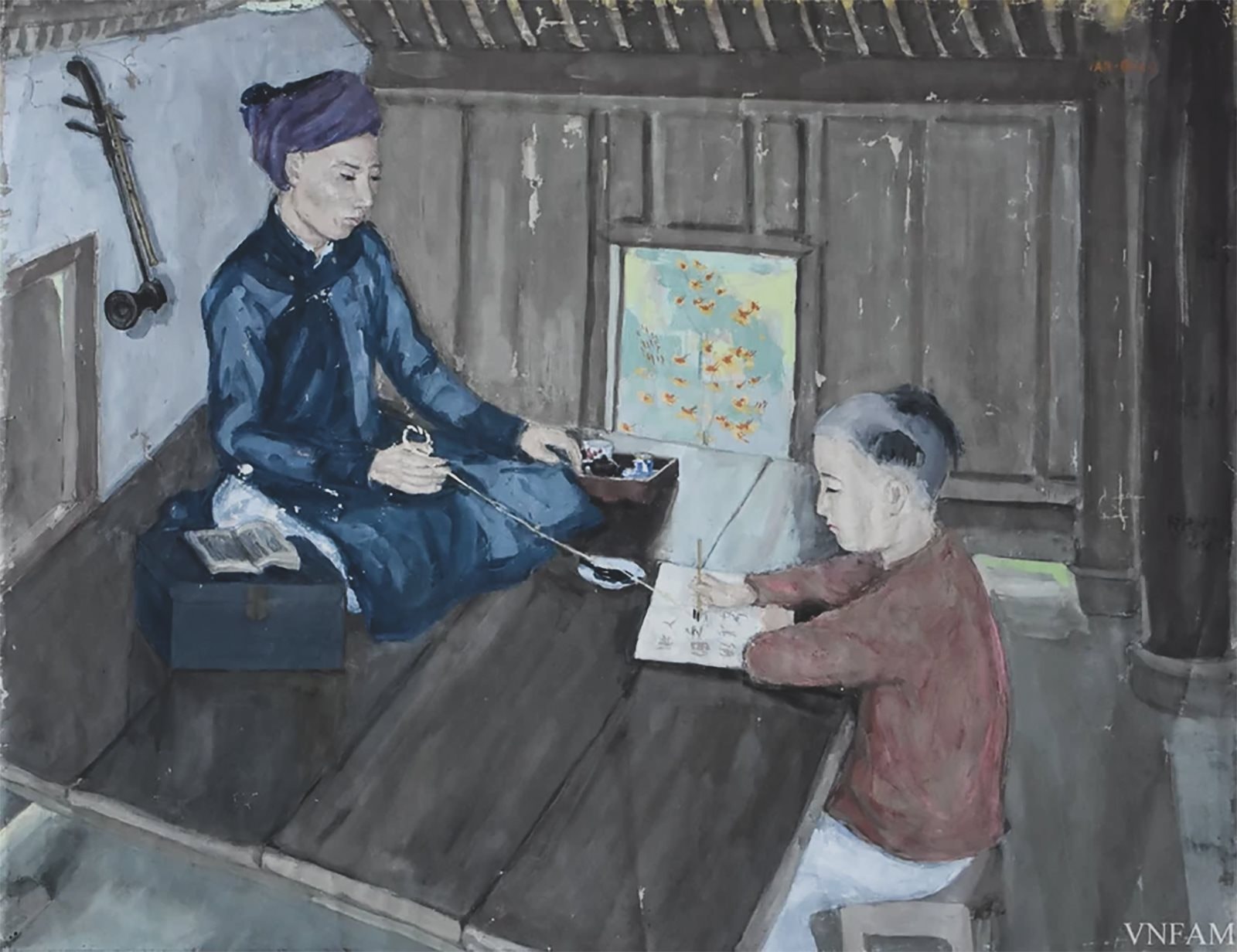
In the spring of 1903, Nguyen Tat Thanh followed his father to Vo Liet commune, Thanh Chuong district, Nghe An province and continued to study Chinese characters. Here, Nguyen Tat Thanh had the opportunity to listen to current events from the scholars who came to discuss with his father.
At the end of 1904, Nguyen Tat Thanh followed his father to Du Dong village, Duc Tho district, Ha Tinh province, when Mr. Sac came here to teach. In addition to studying, Nguyen Tat Thanh often followed his father to areas in the province such as Dong Thai village, the hometown of Phan Dinh Phung, to visit the relics of Luc Nien citadel, the temple of La Son Phu Tu Nguyen Thiep...
In July 1905, Nguyen Tat Thanh followed his father to Kien Xuong district, Thai Binh, when Nguyen Sinh Sac went to meet the scholars in that area.
Around September 1905, Nguyen Tat Thanh and Nguyen Tat Dat were asked by Mr. Nguyen Sinh Huy to attend the preparatory class (préparatoire) of the French-native primary school in Vinh city. It was at this school that Nguyen Tat Thanh was first exposed to the sloganLiberty - Equality - Fraternity.
These trips helped Nguyen Tat Thanh broaden his vision and thinking. He realized that everywhere people were suffering from hunger and poverty, so it seemed that within them there were smoldering fires that wanted to burn out the colonial and feudal oppressors. Faced with the suffering of the people, he soon "had the will to expel the French colonialists and liberate his compatriots".
After many years of delaying becoming an official, at the end of May 1906, Nguyen Sinh Huy entered the capital to take office. Nguyen Tat Thanh and his brother followed their father. In Hue, Nguyen Tat Thanh and his brother were sent by their father to study at the French-Vietnamese Primary School in Thua Thien province, preparatory class (cours préparatoire, September 1906); elementary class (cours élémentaire, September 1907).
In Hue, this time a memorable event occurred in the life of Nguyen Tat Thanh. In April 1908, he participated in the anti-tax demonstration of Thua Thien province farmers, starting his lifelong struggle for the rights of the working people. Because of his patriotic activities and participation in the farmers' struggle, Nguyen Tat Thanh was closely monitored by the French colonialists. Mr. Nguyen Sinh Huy was also reprimanded by them for allowing his son to engage in anti-French activities.
However, in August 1908, Nguyen Tat Thanh, with the name Nguyen Sinh Con, was still accepted by the Principal of Quoc Hoc Sukê (Chouquet) to study at the school. In September 1908, Nguyen Tat Thanh entered the intermediate class (second grade) (cours moyen) at Quoc Hoc Hue School.
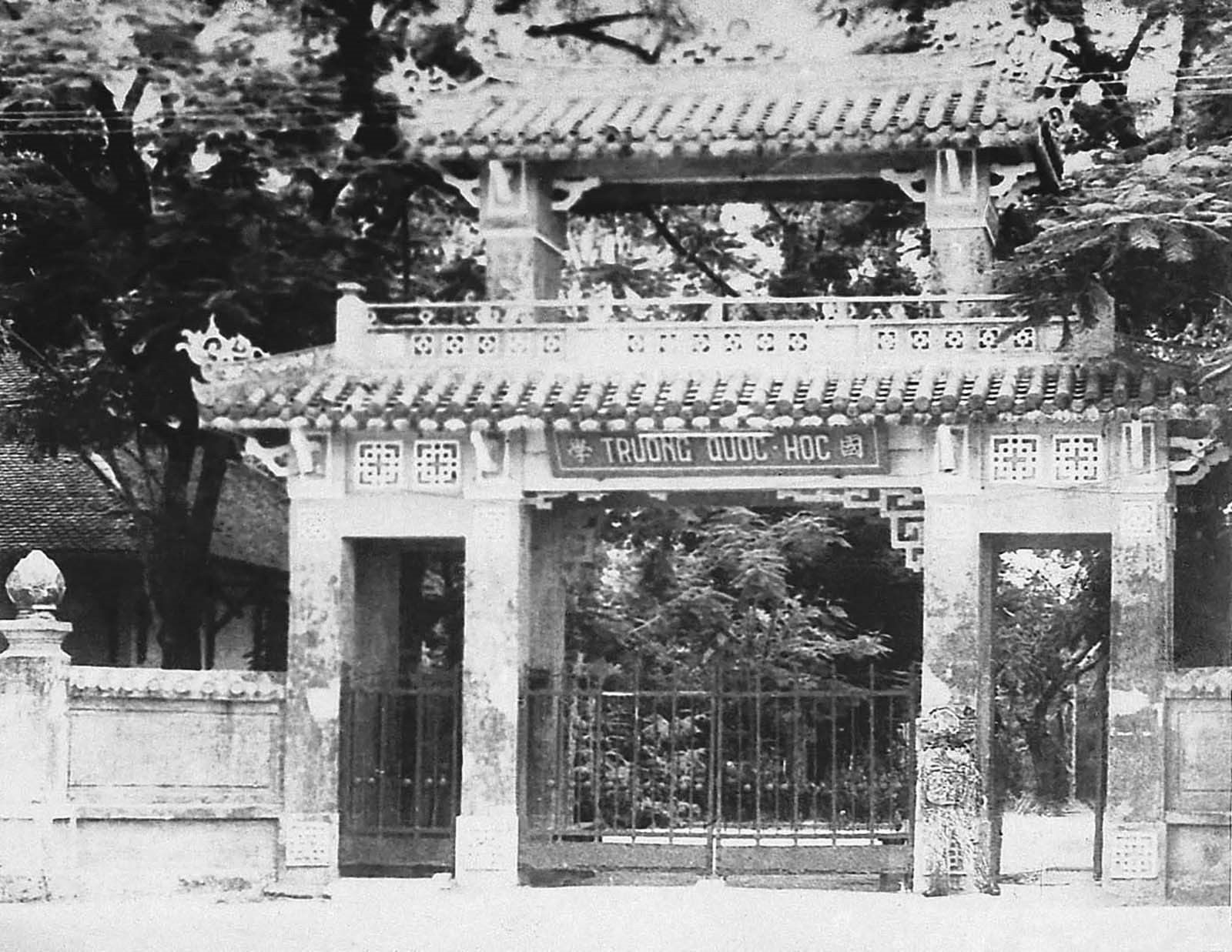
During his time studying at Hue National School, Nguyen Tat Thanh was exposed to many French books and newspapers. The teachers at Hue National School were both French and Vietnamese, as well as patriots such as Mr. Hoang Thong and Mr. Le Van Mien. It was thanks to the influence of patriotic teachers and progressive books and newspapers that he was exposed to, the desire to go to the West to learn about the situation of other countries and learn about the achievements of human civilization gradually grew in Nguyen Tat Thanh's mind. At the same time, Nguyen Tat Thanh also heard about the actions of patriotic kings such as Thanh Thai and Duy Tan and discussions about the path to national salvation among patriotic scholars.
Around June 1909, Nguyen Tat Thanh left Hue National School to follow his father to Binh Dinh, when he was appointed as the District Chief of Binh Khe. During his time in Binh Khe, Nguyen Tat Thanh was often taken by his father to visit scholars in the area and to visit historical sites in the Tay Son region.
At the end of 1909, Nguyen Tat Thanh was sent by his father to continue his studies in the college program (first class - cours supérieur) at the French-Vietnamese Primary School in Quy Nhon. Mr. Nguyen Sinh Sac understood his second son's ability and ambition, so he created conditions for him to continue his studies.
In June 1910, Nguyen Tat Thanh completed his primary education. After hearing that his father had been dismissed from his position as District Chief of Binh Khe and recalled to the capital, he did not follow his father back to Hue but decided to continue south. On the way from Quy Nhon to Saigon, Nguyen Tat Thanh stopped in Phan Thiet. Here he applied to be a teaching assistant (moniteur), was assigned to teach a number of subjects, and was also in charge of extracurricular activities at Duc Thanh School, a private school founded in 1907 by Mr. Nguyen Trong Loi and Mr. Nguyen Quy Anh (son of Mr. Nguyen Thong, a patriotic scholar).
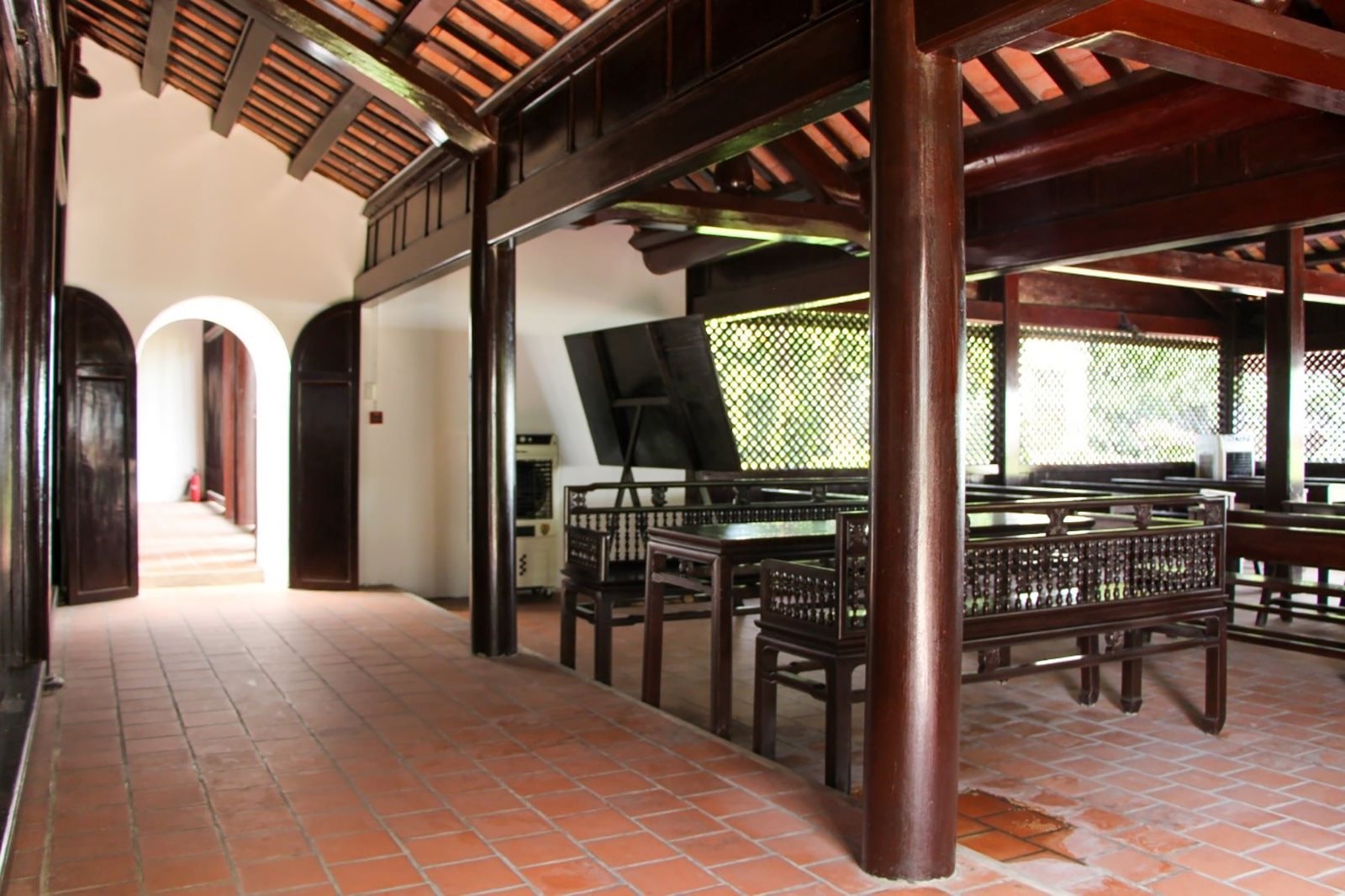
Outside of class, Nguyen Tat Thanh searched for valuable books in Nguyen Thong's bookshelf to read. For the first time, he was exposed to the progressive ideas of French enlighteners such as Rousseau, Voltaire, and Montesquieu. The exposure to these new ideas further motivated him to find a way to go abroad.
In February 1911, Nguyen Tat Thanh left Phan Thiet for Saigon. He temporarily stayed at the headquarters of the Lien Thanh company branches in Saigon, such as house number 3, Tong Doc Phuong street (now number 5, Chau Van Liem street); house number 128, Khanh Hoi. In Saigon for a short time, he often went to the poor worker neighborhoods, getting to know young people of the same age. Everywhere he went, he saw the working people being oppressed and humiliated. Nguyen Tat Thanh also often went to the shops near Saigon port, which specialized in laundry for sailors on French ships, to find a way to get a job on the ship, realizing his dream of having long trips.
Nguyen Sinh Cung - Nguyen Tat Thanh was born and grew up when our country was invaded by French colonialists and had become a semi-feudal colony. The people were enslaved, hungry, and miserable. The homeland had a tradition of heroic struggle against foreign invaders. The 10 years living in the capital Hue - the cultural and political center of the country, exposed to new cultures and the Duy Tan movement, gave Nguyen Tat Thanh many new insights.
.jpg)
Looking back at patriotic movements such as the Can Vuong movement, typically the Huong Khe uprising led by Phan Dinh Phung; the Dong Du movement led by Phan Boi Chau; the Dong Kinh Nghia Thuc movement; the Yen The uprising led by Hoang Hoa Tham; the reform movement led by Phan Chau Trinh and the anti-tax movement of Central Vietnam farmers, he greatly admired and respected his predecessors, but Nguyen Tat Thanh did not follow that path.
The failure of patriotic movements in the early 20th century raised many questions and influenced Nguyen Tat Thanh's aspirations, leading him to make a bold and correct decision to go abroad to find a way to save the country.

